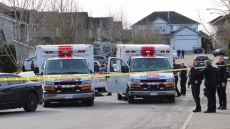TORONTO - Two men found guilty of terrorism charges in connection with a plot to derail a passenger train between Canada and the U.S. were granted a new trial Tuesday after Ontario's highest court found the jury that convicted them was improperly selected.
Raed Jaser and Chiheb Esseghaier were found guilty in 2015 on a total of eight terror-related charges between them. They were sentenced to life in prison with no chance of parole until 2023.
The two challenged their convictions, and lawyers for Jaser argued the trial judge mistakenly rejected their client's request regarding the method of jury selection.
The lawyer appointed to assist Esseghaier — who continues to be self-represented — agreed in written arguments that a new trial had to be ordered on that ground.
The law regarding jury selection was in flux during the trial but the appeal court said in its ruling that the approach used by the judge has since been deemed wrong. Several other cases have been overturned due to similar errors in recent years.
Though Esseghaier, who largely chose not to participate in the trial proceedings, had not expressed a preference as to jury selection, he should receive a new trial, the appeal court said Tuesday.
"Here, one jury was selected for both appellants. In the circumstances of this case, as the jury was not properly constituted for Jaser, it cannot be considered to have been properly constituted for Esseghaier," the court said in a unanimous decision.
Jaser had also raised other grounds for appeal but the jury issue was heard first. Both men also previously indicated they wished to challenge their sentences, but the call for a new trial makes that unnecessary.
The pair was arrested in April 2013 after a months-long investigation that involved an undercover FBI agent who gained their trust and secretly recorded hours of their conversations.
The two were recorded speaking about terror plots they would conduct in retaliation for Canada's military actions in Muslim countries, including the derailment of a Via Rail train travelling between New York and Toronto.
Those recordings made up the bulk of the evidence in the case.

